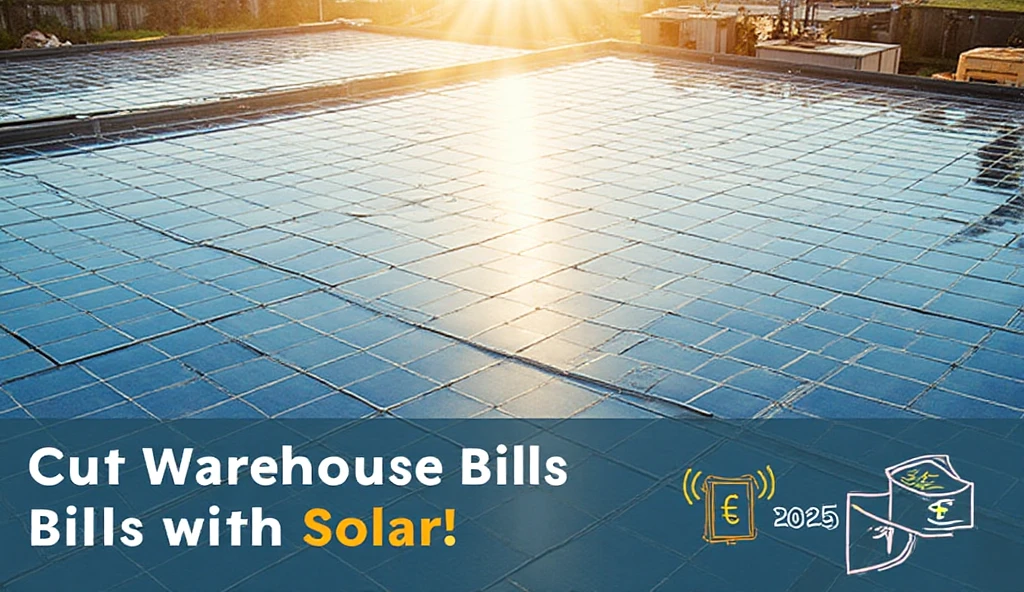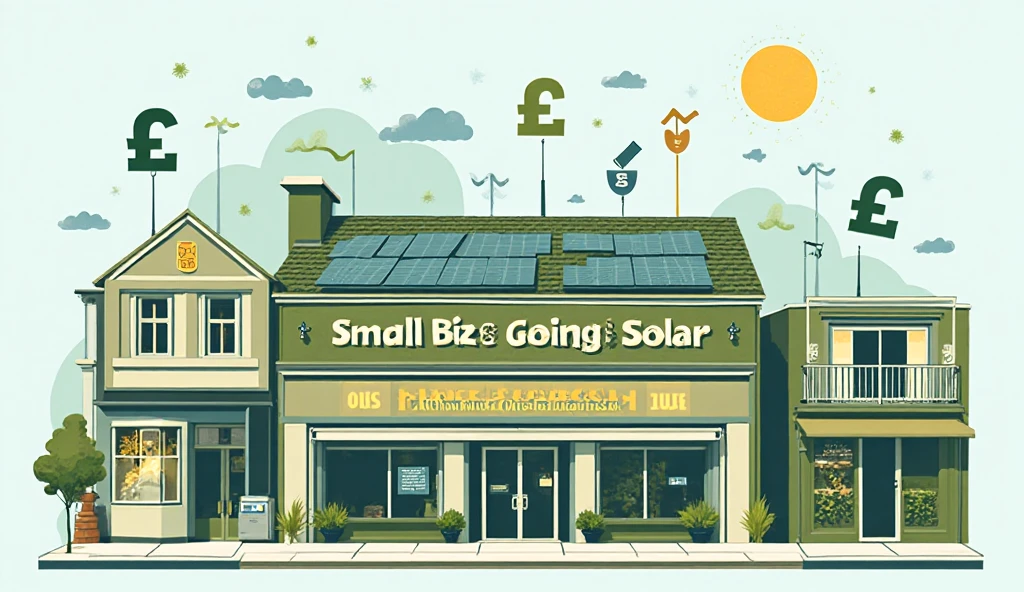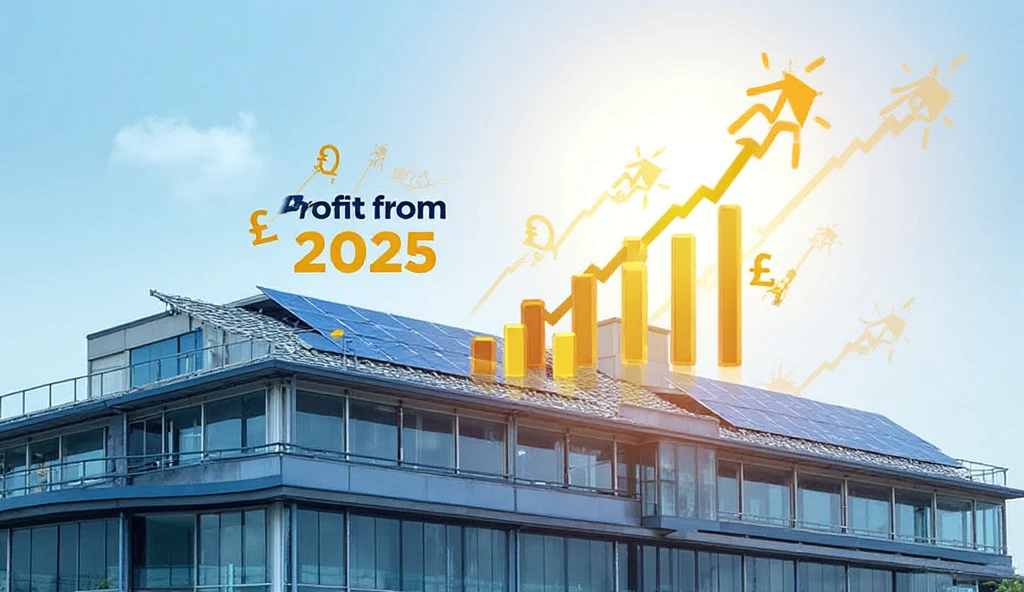With energy prices still high and the pressure to reduce carbon emissions growing, UK warehouse operators are turning to solar power to slash electricity bills and future-proof their operations. Warehouses are often ideal for solar installations due to large, unused roof space and high daytime energy usage. In 2025, cutting energy bills with solar is no longer a niche idea — it’s a smart financial strategy.

Why Warehouses Are Perfect for Solar Power
Warehouses typically have expansive roof areas that receive consistent daylight throughout the year. These large surfaces allow for the installation of high-capacity solar systems — often 50kW, 100kW, or even 250kW or more. Most warehouse activity takes place during daylight hours when solar generation peaks, meaning businesses can use the electricity as it’s produced, reducing their dependence on grid power and avoiding peak-time tariffs
Typical Savings on Warehouse Energy Bills
A warehouse using 50,000 to 250,000 kWh of electricity per year can save thousands by switching to solar. For example, a 100kW solar PV system can generate around 85,000 kWh annually. If 70% of that energy is used on-site, that’s around 60,000 kWh of electricity saved from the grid, potentially cutting annual bills by £10,000–£15,000 depending on your tariff. When combined with the Smart Export Guarantee (SEG), businesses can earn income from any excess energy fed back into the grid, typically worth £500 to £2,000 per year
Fast Return on Investment
With zero VAT on commercial solar installations in 2025 and the option to claim 100% capital allowances, the payback period for a warehouse solar system is often between 4 and 7 years. After that, electricity costs drop dramatically for the next 20+ years. If your business faces regular energy bill increases, solar becomes a hedge against future price hikes, locking in long-term savings
Maximise Savings with Battery Storage
Pairing solar panels with a commercial battery storage system allows warehouses to store surplus solar energy during the day for use in the evening or during peak tariff hours. This reduces reliance on the grid and increases self-consumption to as much as 85% of total solar output. It’s especially useful for warehouses operating early or late shifts or running overnight security or refrigeration systems
Government Incentives for UK Warehouses
Several schemes make it easier to invest in solar for commercial properties. The Smart Export Guarantee pays you for each unit of excess electricity exported to the grid. Most suppliers offer between 4p and 15p per kWh. Additionally, full capital expensing allows businesses to deduct 100% of the solar investment cost from their taxable profits. This significantly improves ROI and cash flow. Some local authorities and devolved governments also offer regional grants or low-interest loans for renewable energy installations in business properties
Improve EPC Ratings and Compliance
Installing solar panels can significantly improve your building’s Energy Performance Certificate (EPC) rating. This matters because UK regulations increasingly require minimum EPC standards for commercial buildings being let or sold. By improving your EPC, you ensure future legal compliance, protect asset value, and improve leasing appeal for tenants
Reduce Your Carbon Footprint
A 100kW solar system can offset over 20 tonnes of CO₂ emissions annually. That reduction in carbon footprint helps your business meet sustainability goals, enhances your ESG (Environmental, Social, Governance) score, and improves your position in supply chains that prioritise green partners. More customers and logistics partners now consider sustainability when choosing service providers, so solar can be a competitive advantage
Installation is Fast and Low-Disruption
Most warehouse solar panel installations can be completed in under two weeks with minimal disruption to operations. Systems are mounted on the roof and connected to your existing electrical infrastructure. If required, work can be scheduled during weekends or shutdown periods. Since most warehouse roofs are flat or gently pitched, installation is generally straightforward and does not usually require planning permission
Long-Term Equipment Warranties
Solar panels typically come with 25-year performance warranties and minimal maintenance requirements. Inverters, the only major component with moving parts, often include warranties of 10–15 years. System monitoring allows facilities managers to track performance in real-time and identify issues before they affect output. Once installed, a solar system delivers consistent returns with minimal attention
Leasing and PPA Options
If you’d rather not pay upfront, many providers offer solar panel leasing or Power Purchase Agreements (PPAs). These allow warehouse operators to benefit from cheaper electricity without owning the system. Instead, you agree to buy the solar power at a discounted rate from the installer or finance provider. This removes capital expenditure while still delivering savings from day one
Insurance and Risk Considerations
Solar panels can be covered under your building insurance or added as a separate rider. Most insurers in the UK are familiar with commercial solar and provide clear guidelines. A professional installer will ensure the system complies with fire, electrical, and structural safety regulations. Risk assessments should be part of the project plan to ensure protection of assets and staff
Real-World Example
A logistics firm in the Midlands installed a 120kW solar PV system across two warehouse units. With a daytime usage pattern aligned to solar output, they reduced their annual electricity spend by £14,000. After SEG earnings and capital allowances, the system is expected to pay for itself in under five years. The firm also raised its EPC from D to B and uses the installation as part of its carbon reduction reporting
Final Thoughts
UK warehouses are perfectly positioned to benefit from solar in 2025. With large rooftops, high electricity demands, and long operating hours, the economics of solar power are compelling. Whether you’re looking to cut energy bills, comply with environmental regulations, or improve long-term resilience, solar is a powerful tool for operational efficiency. With rising grid costs and strong financial incentives available now, there has never been a better time to act
Speak to an MCS-certified commercial solar installer to assess your roof, estimate savings, and explore finance options. Your next energy-saving move could start generating returns within weeks



Leave a Comment